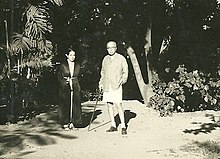Ambalal Sarabhai
Appearance
This article includes a list of references, related reading, or external links, but its sources remain unclear because it lacks inline citations. (October 2020) |
Ambalal Sarabhai | |
|---|---|
 Ambalal with his daughter, the writer, Bharti Sarabhai in 1952 | |
| Born | 23 February 1890 |
| Died | 13 July 1967 (aged 77) |
| Relatives | Sarabhai family |
Ambalal Sarabhai (23 February 1890 – 13 July 1967) was an Indian industrialist, philanthropist, institution builder, and supporter of Mahatma Gandhi. He was the chairman and promoter of Calico Mills and the founder of The Sarabhai Group of Companies. He also was a participant in Indian independence movement.
After Gandhi decided to admit an untouchable family in his Kochrab Ashram, Mangaldas Girdhardas decided to stop his funding to his ashram. At this time, Sarabhai decided to fund this Ashram and gave ₹13000 to Gandhi, which was two year's expenses.[1]
See also
References
- ^ Guha, Ramchandra (2018). Gandhi: The Years That Changed the World. Penguin Allen Lane. ISBN 978-0670083886.
- Basu Aparna, As Times Change. Sarabhai Foundation, 2018. p 115, 123, 124
- M. V. Kamath & V. B. Kher, The Story of Militant But Non-Violent Trade Unionism. Navajivan Trust. 1993. p 37
- Edwin Mortimer Standing, Indian Twilight. Bharati Sarabhai Charity Trust. 1967.
- Howard Spodek, Ahmedabad: Shock City of Twentieth-Century India. Orient Blackswan Private Limited. 2012. p 37, 38, 39, 40, 121–139.
- Erikson, Erik H. Gandhi's Truth: On the Origins of Militant Nonviolence. Faber and Faber Limited. 1970. p 296–303.
- Amrita Shah, Vikram Sarabhai: A Life. Penguin Books. 2016. p 6–13, 27, 29, 40, 45, 54, 66, 77–78, 91, 93, 99–100, 102, 104, 141, 164, 210.
- Kenneth L. Gillion. Ahmedabad: A Study In Indian Urban History. University of California Press Berkeley and Los Angeles. 1968. p 86,87, 170
- Dwijendra Tripathi and Makarand Mehta. Business Houses in Western India: A Study in Entrepreneurial Response 1850- 1956. Manohar Publications. 1990. p 92
- Tirthanker Roy. A Business History of India: Enterprise and the Emergence of Capitalism from 1700. Cambridge University Press. 2018. p 146, 171, 192
- Amrita Shah. Ahmedabad: A City in the World. Bloomsbury Publishing India. 2015
- Kalia,Ravi. Gandhinagar: building national identity in postcolonial India. University of South Carolina. 2004. p 43–45, 50, 51, 53.
Categories:
- Businesspeople from Ahmedabad
- People from Vadodara
- 1890 births
- 1967 deaths
- People from Gujarat
- Recipients of the Kaisar-i-Hind Medal
- Indian businesspeople in textiles
- Gandhians
- Indian philanthropists
- Indian independence activists from Gujarat
- Founders of Indian schools and colleges
- Gujarati people
- Sarabhai family
- Jain Indian independence activists
